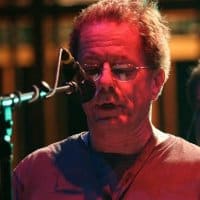Music Career Finder
Survey Start
Music Historian

How To Become a Music Historian
- Career Description
- Salary
- Career Outlook
- Career Path
- Experience & Skills
- Education & Training
- Additional Resources
- Sources
- References
Career Description
Music Historians research and write about music in an historical context. Their work can focus on the history of instruments or musical genres, the lives of artists, or on how musical movements fit into cultural history.
Although their main focus is on research and writing, the majority of Music Historians are simultaneously employed as University or College Professors, Museum Curators, or in another music industry role that allows them the time necessary to work on their projects.
To get an idea of the work that goes into research and writing, Music Historian and Author Dennis McNally tells us about his process in writing A Long Strange Trip: The Inside History of the Grateful Dead and the jazz-influenced Desolate Angel: Jack Kerouac, The Beat Generation, And America.
Describing how he, like most Music Historians, balances his survival job with his calling, McNally says, “I had a part-time job. I would work half the day, then the other half I was researching the roots of the Grateful Dead. This was not only interviewing band members and getting their stories but [since] Jerry Garcia was part of the folk music phenomenon of the ’60s, I interviewed thirty or forty people in the Bay Area.
“There are three ways most people research. One is to go through the university libraries for letters. That’s the traditional way you research. [But] by the ‘60s no one was writing letters anymore. The second way is through popular literature. What I was trying to do specifically was to talk not about Kerouac, but about America. I figured if something appeared in Life magazine, it really was part of the universal subconscious and was useful as a part of the common experience.”
“I read Life from the beginning of the magazine till his death in the late ‘60s. You do that at the library. To some extent, I did that with the Grateful Dead book because there was some info available through the popular press and underground newspapers. The third way was through interviewing people. I tracked down lots of people and interviewed them.”
The research process varies for each book or academic study, however. McNally says that for his most recent book, On Highway 61: Music, Race and the Evolution of Cultural Freedom, “I chatted with a few people. I knew, for instance, Branford Marsalis, whose family is legendary in music and at one point I was going to interview him. [But] ultimately the research for Highway 61 was at the library and listening to old music.
“I read hundreds of books. For five years I sat around and read everything. I did it by going to the library. I read and I read and I read. That was my day. I read books. I listened to some very scratchy old music from the turn of the century.”
Music Historians will sometimes work with the assistance of Music Librarians, and will speak to musicians and Music Journalists for interviews and research. Those employed by institutions of higher learning or museums will work alongside others in their milieu, although most work is conducted alone, especially for independent Music Historians such as McNally.
He says, “I know a few other Music Historians; I’ll talk to them about issues. For instance, I know a guy here in San Francisco who was a Music Critic for years and he has the most amazing music book collection. I consult with people about issues, but mostly writing is a solitary art.”
Salary
On average, Music Historians earn approximately $52,500 annually. The salary range for Music Historians runs from $40,000 to $91,000.
Music Historians who also work at a university or museum will be salaried. Those who are independently employed will get paid when and if a publishing company wants to put out their book. (Some well-established Music Historians also make extra income from lectures and teaching classes.)
So how do Music Historians who write a book get paid? “After you sign the contract you get an advance,” McNally says. “Then the royalties are calculated. You have to sell enough to make back the advance and then you get the royalties. In this day and age, it’s very hard to do that.”
He cautions that, with the years of research that go into writing a book, a Music Historian is generally getting paid less than minimum wage for their work—unless they have a rare superstar publishing deal. “Anybody who thinks they’re going to make a lot of money writing—unless they have the imagination of J.K. Rowling—probably won’t. You better not do it for the money.”
Hey, what do you think about trying our new Music Career HelperMusic Career Helper really quick? It’s totally free and could help get your career moving fast! Give it a try. It’s totally free and you have nothing to lose.
Career Outlook
The lifestyle of a Music Historian will vary based on the person and the employment situation, but the majority will structure their music history work around another job—whether it’s lecturing a college class or working at a record label. This can mean working early in the morning or late at night, depending on when the Music Historian has more free time.
McNally describes his routine: “I write first thing in the morning. As early as I can get myself going, ideally at 7 am when it’s still quiet and the phone hasn’t started ringing. I settle in and I have to write four pages every day. That usually takes somewhere around four hours. Then I go do the rest of the stuff I’ve got to do that day.”
Career Path
Career advancement could come in the form of a larger advance for a book on music history, or in greater sales reaping higher royalties. For Music Historians employed by colleges and universities, it could mean gaining tenure or progressing from a Professor to a department chair or Director role.
Of becoming a Music Historian, McNally says, “It’s one of these things you fall into,” usually as a result of immersing oneself in a music community and writing regularly. He himself started his writing career with a book situating Kerouac within the context of American cultural history of the time, which he sent to the Grateful Dead.
After getting to know Jerry Garcia and the band, they asked him to write the history of The Dead. So, participating in a music community can give an aspiring Music Historian the topic and the connections that will make up the content for a book, and that will also pique the curiosity of publishing houses.
McNally says, “for most people you’re going to be in the academic world because it’s designed where you teach, but you’re supposed to write. The paycheck from the teaching will give you the space to write.” For those looking for university positions, apply for openings as an Adjunct Professor before moving into an Assistant Professor role, and finally a full-fledged Professor position.
Of course, not all Music Historians work for a college/university, a museum, or somewhere else that gives them time for research and writing. Many Music Historians work day jobs and write and research in their off-hours. To get on the path towards becoming a Music Historian, it’s a good idea to get involved in both your local writing and music communities to hone your craft and meet people.
- Learn more. You’ve got the internet at your fingertips. You can find anything out about anybody.
- Write. Listen to a piece of music, write about it, and [then] either you or somebody else carve it up” through the editing process.
Experience & Skills
“You have to know and love music,” McNally says. A knowledge of music, some experience in the world of music, and writing skills are essential for a Music Historian. “I don’t play, but [from] hanging around with the Grateful Dead and hearing musicians talk, I picked up some odds and ends.
“The main thing you need to do is learn about music and musicians, hang out with them and work on the writing. The only way you can learn about writing is to write and be edited, write some more and be edited some more.”
Music Historians work alone much of the time, which can be challenging to more social personalities. Of the type of person who would make a successful Music Historian, McNally says, “You have to have a lot of persistence. You have to be able to put up with rejection. You’re probably going to get rejected by a lot of presses.
“It takes a lot of effort and forcing yourself to work when you don’t necessarily feel like it, so when eventually you get a sentence and a paragraph and a page you actually like, there’s no greater satisfaction.”
Education & Training
Since music history combines a knowledge of music, historical context, and writing skills, a college education will prepare aspiring Music Historians for the academic and publishing worlds. Possible majors could include Music, Musicology, or Music History. Obtaining a graduate degree is advisable. However, McNally believes writing skills are more important than any other form of academic training.
He says, “I do think a higher education is probably necessary just because of the basic skills. But [to gain skills] you write and get edited and it doesn’t matter who’s doing it. Obviously, you need to find the best Editor you can. Maybe that’s the Creative Writing Teacher at your school, or maybe that’s the Editor of a campus newspaper or a website. The only way I know how to write is to write, get [it] chopped up, and write some more.”
Additional Resources
Online historical groups and associations exist for various genres of music. The Society for American Music is the most well-known and prestigious; the group holds conferences, recognizes achievements, and shares academic studies and reviews.
Sources

Dennis McNally
Dennis McNally is an Author, Historian, and Publicist who worked with the Grateful Dead for more than twenty years.
As The Dead’s official Publicist and Historian, he wrote the books Jerry on Jerry: The Unpublished Jerry Garcia Interviews and A Long Strange Trip: The Inside History of the Grateful Dead. Other titles include Desolate Angel: Jack Kerouac, The Beat Generation, and America and his recent On Highway 61: Music, Race and the Evolution of Cultural Freedom, winner of the prestigious ASCAP Deems Taylor/Virgil Thomson award.
As a Publicist, he has worked with the likes of Bela Fleck and Edgar Meyer, Little Feat, and New Riders of the Purple Sage, among others. He is an alumnus of UMass Amherst. McNally’s research notes and Dead interviews are housed at the University of California, Santa Cruz’s Grateful Dead Archive.
McNally’s work has been featured in Kirkus Reviews, Reuters, The New York Times, CNN, Washington Post, JamBands.com, NPR, SF Travel, SF Gate, Huffington Post, The Independent, Glide Magazine, and C-Span.
Dead fans can check out presentations McNally has done at The Harker School, New School Commonweal, the San Francisco Public Library, and S.O.U.L. Listens.
Podcast fans can hear more about McNally’s experiences as a Music Historian through his appearances on The Sound Podcast, No Simple Road, and Festival Nation.
References
- 1Multiple. "MUSIC Historian Salaries in United States". Glassdoor. published: . retrieved on: Dec 17, 2019